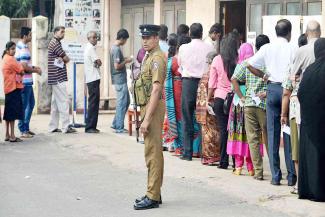The outcome of the presidential election in Sri Lanka has sprung a major surprise. Rejecting the two parties or coalitions that have long dominated Sri Lankan politics - the Sri Lanka Freedom Party and the United National Party - Sri Lanka has opted for a new choice. Anura Kumara Dissanayake, leader of the Janatha Vimukthi Peramuna (JVP) has won the presidency as a candidate supported by the coalition National People's Power (NPP). The announcement came after the second round of counting of preferential votes - Dissanayake, though falling short of the 50% benchmark, was announced the winner way ahead of his rivals. Dissanayake polled 42.31 percent of the popular vote while runner-up Sajith Premadasa, head of the opposition alliance Samagi Jana Balawegaya (SJB), secured 32.76 percent and incumbent President Ranil Wickremesinghe finished a distant third with 17.27 percent of the popular vote.
While the rise of the JVP/NPP to the centre of the Sri Lankan election scene may appear rather sudden and spectacular (five years ago Dissanayake had polled only a little above 3 percent), the JVP has been a well-known political entity in Sri Lanka for decades. Formed in 1965 as a breakaway communist group by Rohana Wijeweera, the JVP led a failed insurrection to capture power in 1971 leading to the arrest of Wijeweera and other JVP leaders and activists. Wijeweera was released in 1977 and JVP entered the electoral arena. In 1982 Wijeweera polled 4.16 percent vote to finish third in the presidential poll. In 1987 after the signing of the Indo-Sri Lanka accord, the JVP which by this time had embraced a virulent anti-Tamil Sinhala chauvinism, launched another organised insurrection, which too failed. After Wijeweera's death, JVP supported the SLFP in 1994, the main opposition party of the time, and in 2004 it joined the UPFA government and supported the war against the LTTE. Though emerging from the Left movement in Sri Lanka, over the years the JVP thus acquired a strong Sinhala chauvinist streak which has become its main driver at certain key junctures.
However, the trigger for the surprising JVP/NPP victory in 2024 came from the popular upheaval known as Argalaya (the struggle) that swept Sri Lanka from March 2022 and evicted the ruling Rajapaksa government and ended its family control over much of the Sri Lankan administration. Acute economic crisis caused by mismanagement and corruption, crony capitalism and external pressures (including pressure from the Modi government to give energy sector contracts to Adani) undermining Sri Lanka's economic sovereignty had landed Sri Lanka in an unsustainable situation. This coupled with the anger against the Rajapaksa family's expanding control over the Sri Lankan economy and administration had made the Rajapaksa brothers Gotabaya and Mahinda extremely unpopular. The Argalaya reflected a deep quest for an alternative and the election result also reflects the same with Dissanayake becoming the beneficiary of this popular quest.
The result however also reflects the fractured state of Sri Lankan society. Dissanayake polled very low votes in Tamil and Muslim dominated regions. Otherwise, he could have crossed the 50 percent benchmark in the first round itself. In the second round when second preference votes were counted, it was Premadasa who led over Dissanayake. The Dissanayake campaign did make a lot of promises to bring about economic recovery, root out corruption and defend Sri Lanka's political and economic sovereignty, but there were no real overtures to win the trust of the Tamil and Muslim minorities. If Dissanayake wants to make a really new start in Sri Lanka it cannot be done just on the basis of changes in economic policies, it will also call for some real reconciliation with the minorities and reconciliation can only happen on the basis of acknowledgement of truth, and delivery of justice. The ball is in Dissanayake's court.
The changes in Sri Lanka are also an important test for India's foreign policy. In the Modi era, India has become more isolated from almost all neighbouring countries. The SAARC, the main platform for regional cooperation in South Asia has virtually been abandoned. India's increasing strategic proximity and convergence with not just the United States but also Israel has contributed to India's isolation from its neighbouring countries. The distrust is deepened by the Modi government's policy of exerting pressure on these neighbours to secure contracts for Adani and other big corporates. From Australia to Bangladesh, and Sri Lanka to Kenya, it is now well known how Modi has consistently gone out of his way to serve Adani's interests. If the new regimes in Bangladesh and Sri Lanka cancel the Adani contracts, these are not ‘anti-India moves’ by our eastern and southern neighbours but simply defending their own economic interests.
The Modi government's support to Israel at a time when the Netanyahu regime has been waging a relentless genocide on Palestinians for the last one year and is now escalating the offensive into a war on Lebanon, has also made Indian foreign policy increasingly unpopular in South and West Asia. India must of course insist on the security of minority communities both in Bangladesh and in Sri Lanka where there is a painful history of ethnic cleansing and today the RSS is a growing presence building alliances with Sinhala Buddhist extremists. But there must be no knee-jerk reaction to brand the new regimes as anti-India or pro-China. Indian foreign policy must be geared to working closely with the Dissanayake government in the spirit of genuine bilateralism and regional cooperation.











